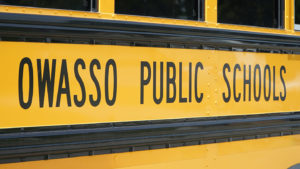Expert says Oklahoma textbook market needs to stop following California models
With news several textbook publishers have withdrawn from Oklahoma over new, stricter standards, one expert says it’s time the textbook publishers catch-up to needed reforms.
“We’re going to…

With news several textbook publishers have withdrawn from Oklahoma over new, stricter standards, one expert says it’s time the textbook publishers catch-up to needed reforms.
“We’re going to see more and more states imposing better standards, more states moving to these improved standards, and the textbook market will follow if they want to compete,” Trent England, the David and Ann Brown Distinguished Fellow at the Oklahoma Council of Public Affairs (OCPA) told The Lion in an interview.
For too long, progressive, blue states have dictated to the textbook marketplace what is in the actual books, and now is the time for change, said England.
“I think for too long, California has played an outsized role dictating to the rest of the country what winds up in textbooks,” added England. “What we’re seeing now is that conservative states are not going to keep going along with the latest educational fads that are being imposed in some of these blue states that just keep moving farther and farther to the extreme.”
Last week, the Oklahoma Voice “sounded the alarm” about textbook publishers that have withdrawn from consideration by the Oklahoma Textbook Committee because new, proposed standards might make their textbooks ineligible to be used in the state.
At issue is the inclusion of controversial, progressive concepts such as social, emotional learning (SEL), critical race theory (CRT) and other ideological content, which conservatives say have no business being in math textbooks.
A local Tulsa moms group especially objected to SEL content in math textbooks.
A leader of the Tulsa County chapter of Moms for Liberty said at an Oct. 6 state textbook committee meeting that one company’s bid should be rejected because its elementary math textbooks contain social-emotional learning concepts that do “not belong in mathematics,” reported the Oklahoma Voice, in a story that was widely reprinted by other media outlets all over the state.
The current leadership of the Oklahoma Department of Education (ODE) agreed with that assessment, commenting that SEL “actually encompasses the far-left belief that each child is nothing more than a member of an oppressed class, or the oppressor themselves.”
Many Oklahomans seem to also agree, if last November’s election is any indication.
In November 2022, Republican Ryan Walters easily defeated Democrat Jenna Walters in the general election for Superintendent of Public Instruction, 57% to 43%.
Walters campaigned with promises to push back against progressive content that hasn’t helped student test scores in the state, but simply serve as an ideal logical backstop for entrenched education bureaucrats, such as teachers’ unions, which he characterized at the time as terrorist organizations.
“Unlike the previous administration, Superintendent Walters is committed to eliminating woke indoctrination in Oklahoma classrooms, including in textbooks,” said Dan Isett, a spokesperson for the ODE, about the textbook controversies. “Consequently, the process is different now from in years past because it includes an extra layer of review.”
For the OCPA’s England, the pushback from textbook publishers is unsurprising, but it obscures the question that really ought to be asked, which has nothing to do with which textbooks were published last year.
The most important question, England says, is: Which textbooks should be published this year and in future years to help students achieve better results in Oklahoma?
“It’s a funny argument for the other side to make [about the textbook changes], because they’re basically defending last year’s fad,” England concluded. “They’re defending the current set of educational fads, which are relatively new, and aren’t really working. The idea that we can’t change things like the latest fad in education is kind of an inherently silly argument. Because if you don’t, you’ll never have any changes in standards and curricula.”
And changes in standards and curricula are exactly what it seems a large majority of voters in Oklahoma voted for last year, even if it might inconvenience a few textbook publishers.



